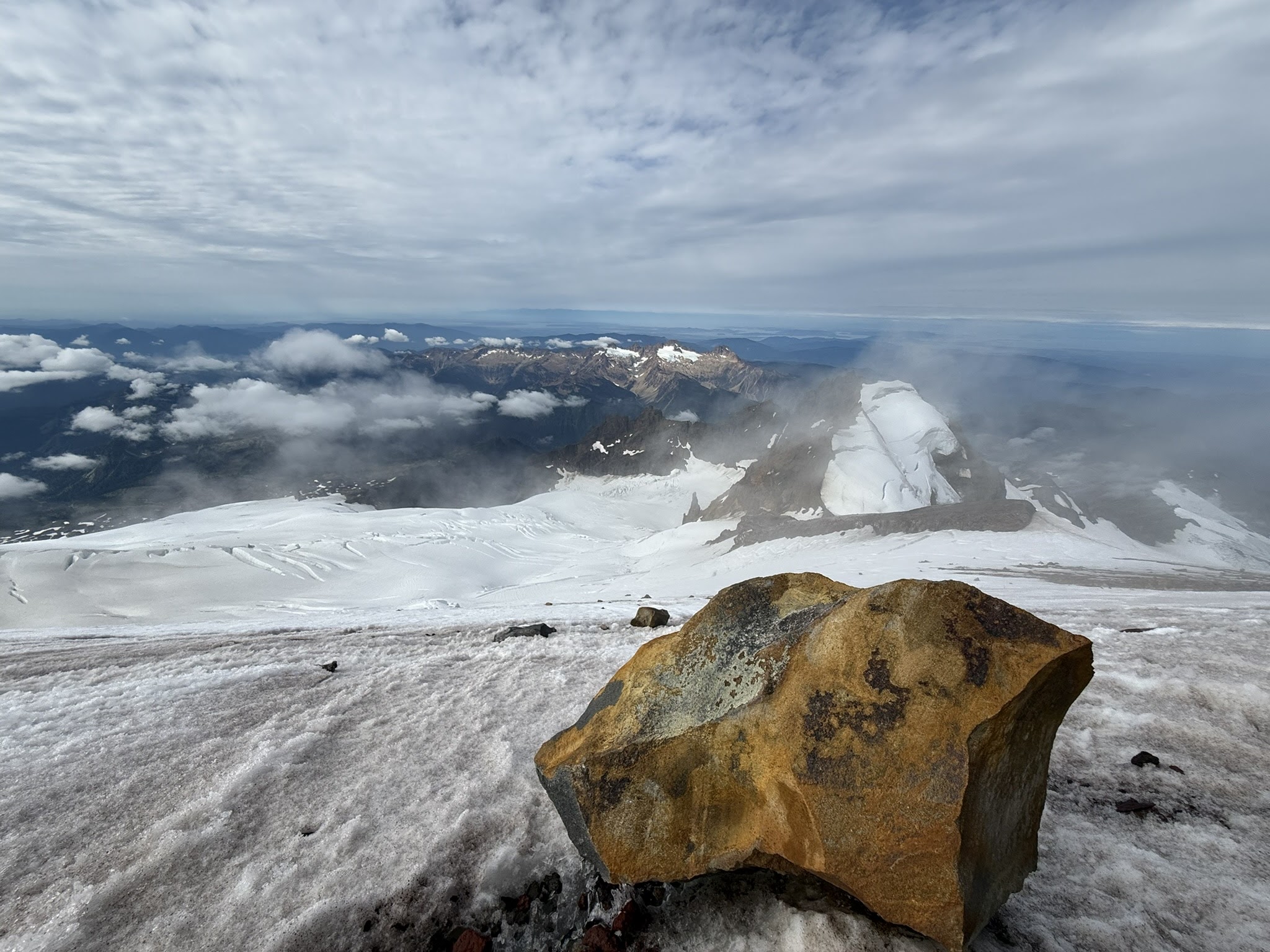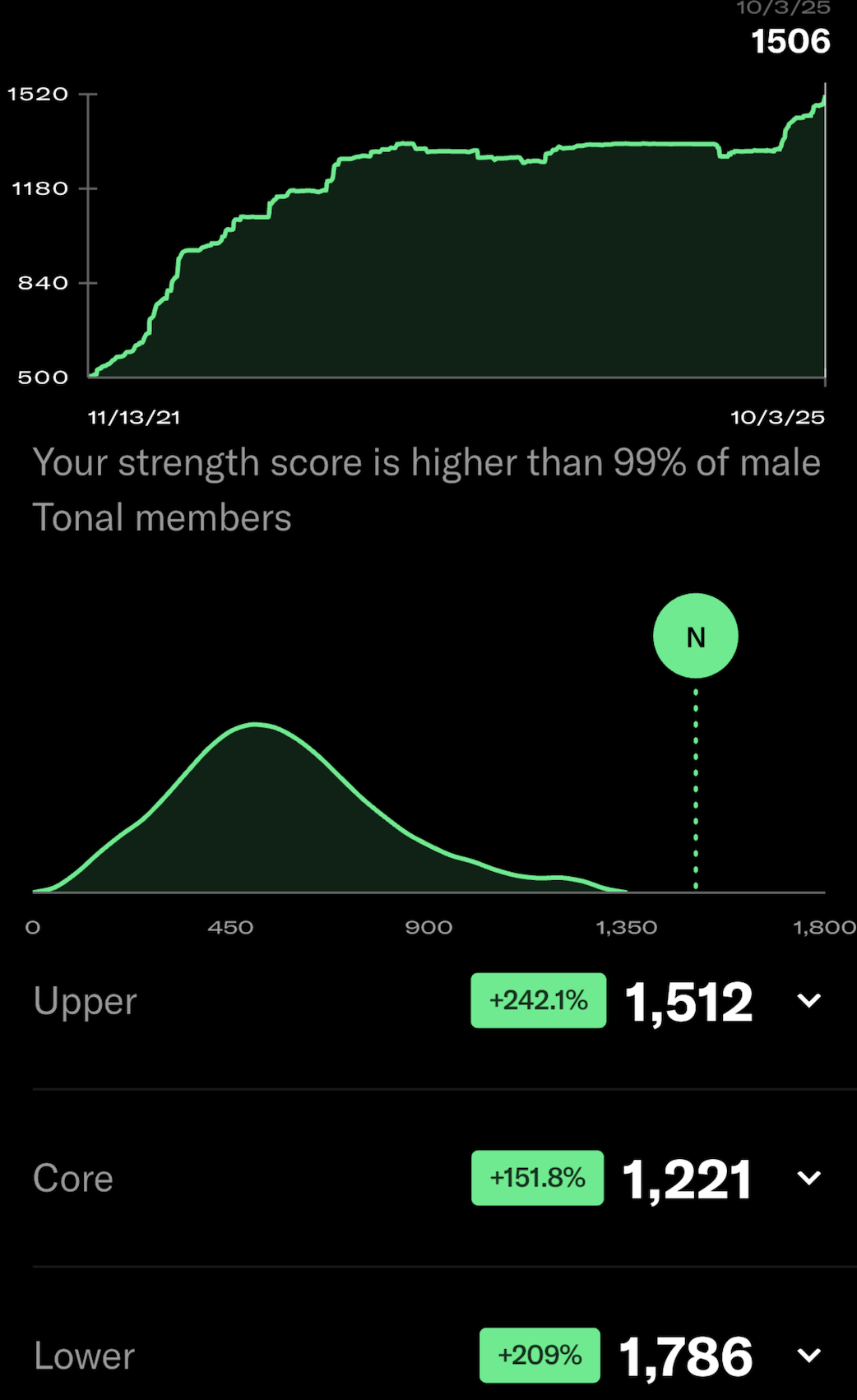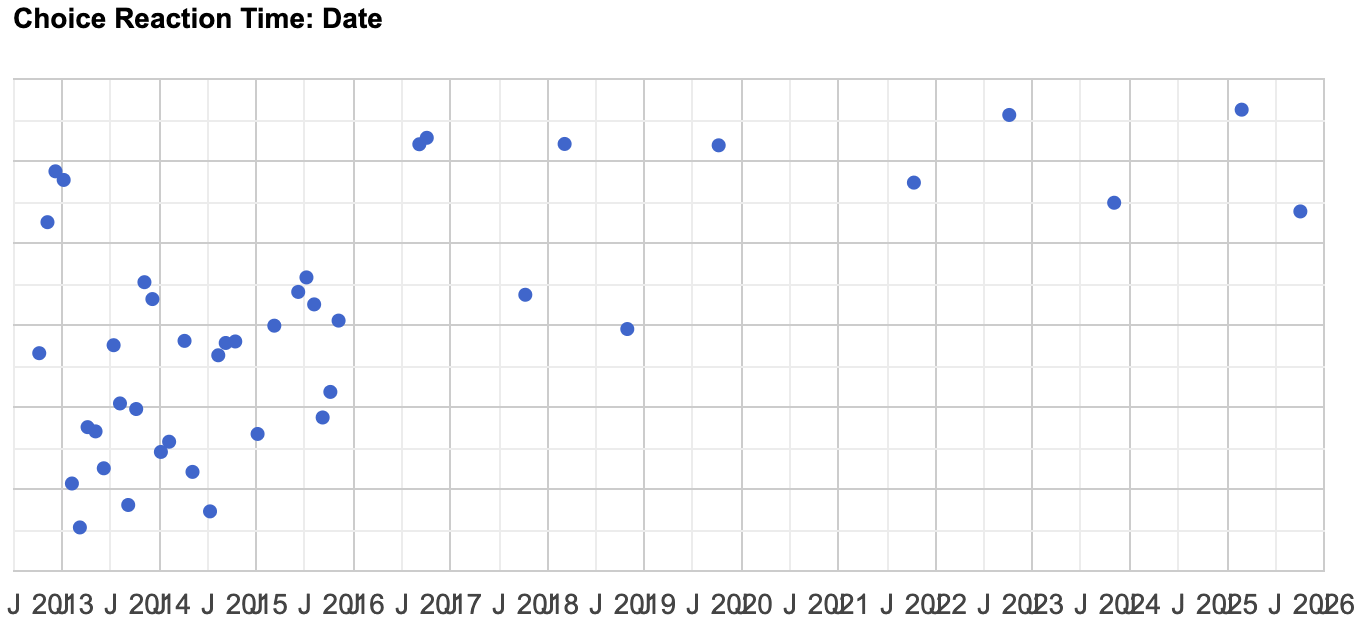
A friend's former high school art teacher imprinted upon us the lore that "your 30s are a grind". I can confirm. As I cross into my 40s, it feels like I'm still striving, but I've built enough skills and momentum that what used to be all-consuming is now comfortable, and I have found some measure of balance. Dare I say that things are going, not just according to plan, but better than expected? From fitness to family to work to surprise home ownership, I've had a great year, and today's Me Day has been a great day. On to the reflection and personal inventory!
This year's hike involved more technical mountaineering on rope, as I attempted a two-day summit of Mount Baker alongside Zach and George. We got to about 700 feet from the summit, then turned around due to unsafe ice conditions late in the season (we could have made it up the last bit, but it would have been sketchy getting down again if slightly more ice melted, even with crampons and on rope). It was a beautiful hike:

... but the downside of glacier mountaineering on rope is that you are strung out to reduce crevasse fall risk, so you can't talk to your bros during the endless trudging portions. I did get to descend about twenty feet into a seemingly bottomless crevasse, which was primally terrifying. On day two, we picked up a solo climber, Nathan, and added him to our rope team for safety and camaraderie, but apart from that, we had the entire glacier to ourselves. Next year, we aim to do something more chill, perhaps more mountain-lake-style than glacier-style. The annual hike tradition continues to serve to anchor both a training plan and the connection to the guys.

Ahead of the Baker climb, I did a lot of hiking training to get my feet ready and to increase my cardio endurance. I also increased the duration and regularity of my strength training, and in May I also dialed in my nutrition through precise macro counting. The training programs were a collaboration between me, an online coach, and many experiments with AI. Apart from a brief hiatus in the spring when I broke my ankle on my electric longboard (which also switched our hike target from Rainier to Baker), I've been extremely consistent and seen the best training results since the summer of 2012, when I was training for Motivation Hacker book missions including marathon, 5K, and bench press.
My Tonal home gym strength score has gone from 1341 to 1506, and especially since starting my post-broken-ankle-strict-macro-tracking-cut in June, I've seen big improvements in body composition:
I also switched from using what turned out to be extremely inaccurate VO2 max estimates from Apple Watch to clinically tested VO2 max results from max-effort cycling while breathing into a mask, which revealed a pretty good 47.5 at the same time the watch was estimating a terrible 34.7.



At the same time, I got a DEXA scan, which put me at 13.6% body fat a month ago, 1% above my at-home smart scale's reading. I dropped 1.4% on my scale since then, so if the pattern holds, DEXA might read around 12.2% now. I will test again around Halloween, which is my next short-term goal date. The kids are obsessed with K-Pop Demon Hunters and are theming Saja Boys and HUNTR/X this year, and I have been assigned to play Abby, whose defining feature is his abs, so I need to finish getting shredded by the end of the month. Let's go!
Chloe has also been doing strict training and nutrition with her coach throughout this time, and so she pulled me back into regular progress photos, which I haven't been doing since 2015. I feel like I'm looking pretty similar to that time, but definitely more toned than I was for the past several years.
Now that I'm going through all the effort of training six days a week for an hour a day, hitting strict macro targets, hitting minimum step targets with my under-desk treadmill, taking all sorts of regular measurements, paying for coaching, and even making my own food that isn't MealSquares (omg I know), I want to see how far I can go on strength, body composition, endurance, and lower back resilience. I plan to cycle between bulking and cutting, with the current cut ending in a month or three when bodyfat bottoms out.
Goals for next year
I have been stuck at 31-44 push-ups and 16-22 pull-ups since I started measuring these annually in 2013, with last year at 44 and 21. I hadn't been doing free push-ups or pull-ups all year, just training bench press and lat pull-downs on Tonal, so imagine my surprise at this year's numbers:
60 push-ups, +16: fast, strict, chin touching the ground.
29 pull-ups, +8: fast, no kipping, chin above bar.
I wonder what my free weight non-Tonal maxes would be on index lifts like bench, deadlift, and squat right now. I'll be interested to find a gym and a spotter, once I'm sure my lower back is ready for it. My highest-ever bench was 195 lbs x 1 rep in September 2019, deadlift was 305 lbs x 5 reps in May 2019 (with trap bar, easier than straight bar), and squat at 255 x 5 reps in June 2019, all from during training for the powerlifting competition I did with my dad that year. I've only been training Tonal, not free weights, but I should be able to beat those numbers this year if I keep training this regularly, especially since 2019 only had 44 max push-ups.
Average amount of reading this year. Went back on a ratfic kick, triggered by re-reading Harry Potter and the Methods of Rationality to Max, which was the main bedtime book for most of the year. It was extremely gratifying to watch him react to the story's epic plot points in real time, and that he's old enough now to understand and appreciate my all-time favorite book. We finished reading it last night. Also in Eliezer Yudkowsky reading news, I recently finished If Anyone Builds It, Everyone Dies, which is a must-read for anyone wanting a lay explanation of the AI existential risk problem that is driving my work. (I noticed that one of my blog posts was cited in passing as a reference, which was a fun detail.)
I wanted to get back to finishing Me Day updates in one day and so didn't pull out a whole favorite book to read, but I did go reread Three Worlds Collide, a short story about baby-eating aliens that did not disappoint.
Year Books Pages
2008 28 8,946
2009 18 7,244
2010 12 3,312
2011 16 6,469
2012 35 13,985
2013 33 11,760
2014 15 5,796
2015 30 18,694
2016 16 8,487
2017 17 6,824
2018 14 7,423
2019 21 13,901
2020 7 3,408
2021 3 1,538
2022 6 13,460
2023 22 17,459
2024 19 9,541
2025 14 8,883 so far

Ruby has gotten a little harder to deal with in her threenager and fournado phase, but Max and Clark at 10 and 8 are like next-level evolved elder upper highlands champion elite versions of their younger selves. Today they not only made me breakfast in bed, but also no-sugar protein cookies that were macro-friendly while somehow tasting just as good as normal cookies (well, at least as far as I remember them tasting from when I was still eating desserts 13 years ago). Lots of roughhousing, gaming, crafting, hiking, and just generally having fun with them these days. This is what it's all about, this right here.
Pretty similar results to last year. Iron saturation's a little high, as per usual, but ferritin is low, suggesting it's probably not time for another blood donation yet. Heart health, hormones, vitamins, and minerals all looking good.
Stable growth, then bought a very expensive house. Goodbye, liquid assets! Chloe had wanted a house for so long, and I was ambivalent about losing the flexibility of renting, but finally it didn't make sense to put it off any more. We closed on it yesterday, so happy birthday to myself! Just like I was content turning 30 because I'd just passed the fatherhood life milestone by creating Max at 29, it makes it easier to turn 40 when I'm still unlocking achievements like home ownership, hitting PRs on my fitness goals, and achieving other literal mountaintop experiences.

(If you're me, you get to see finance stats here. Since you're not me, you see nothing.)
Some scores higher this year, some lower, everything well within normal variation. No sign of cognitive decline yet.

I ran across an interesting post last month, Age and Cognitive Ability, making the argument that traditionally understood cognitive decline from 20s through 50s is actually largely an artifact of measuring different birth cohorts and attributing cognitive differences to aging, rather than to birth year, which has a larger impact because of general Flynn effect progression. That is, let's say in 2000 you measure people's IQ or other cognitive skills: some at age 20 (born in 1980), some at age 60 (born in 1940). Most of the apparent "decline" is because 1940 birth cohort didn't have 40 years of Flynn effect compounding, not because of the 40 years of aging.
The common wisdom I had absorbed, based mostly on these cross-sectional studies, was that fluid intelligence peaks in one's 20s and sharply declines from there, while crystallized intelligence slowly builds over time. That's part of what this whole Quantified Mind aging tradition was all about: try to find the signs of that supposed 30s decline. I haven't seen any, which has been a little surprising under my old paradigm, but which would be fully expected if one accepts this argument, which seems rather obvious now that it's pointed out (how have I not have heard it before?).
I do think the post goes a little too far in its conclusion that the intelligence actually grows throughout 30s and 40s, which it justifies by nearly fully dismissing practice effects in longitudinal studies, such as the main cited Seattle Longitudinal Study, where cohorts are tested every seven years. I do these tests every year, after a long more-frequent practice period to "wash out" initial practice effects, and I still feel myself developing new cognitive strategies for some of the tests, even though they are "low-level" primitives and shouldn't have much strategy involved, being quite close to the raw mental skill being tested. For participants who take a complex test battery once at 25, and again at 32, and again at 39, etc., I find it very plausible that they remembered, if not any of the exact questions, some general patterns, or perhaps they fixed some mistaken strategies recalled from prior tests. Also, not sure if they were able to adjust for less-healthy subjects who weren't "aging well" being more likely to drop out of their test cohorts over time, also biasing scores upwards. Yet I will mostly buy that there is usually little-to-no decline in cognitive subskills until somewhere in one's 50s-60s, if not the post's stronger claim that most skills keep increasing through one's 30s and 40s and peak in one's 50s.
Everything agrees that cognitive decline starting in 70s is typically rapid and severe. I've seen some other data that suggest to me that you can probably delay that further by being in excellent health (someone super fit in their 70s whose "biological age" is in 40s-50s for most measurements perhaps won't start that cognitive slide so quickly), but it's still pretty bonkers to me how many of our political leaders are clinging on at those ages. Biden being President from 78 to 82 years old, Trump trying the exact same thing but 5 months older for his second term, Xi and Putin at 72... it's not just that there's no way they can be as sharp as they used to be, but also that they're not even close to digital-native understanding of recent technologies, let alone AI. Can we go back to world leaders without declining brains?
Chloe had planned something fancy, but then she and Max came down with COVID the past two days, so had to reschedule it to October 28. What could be so fancy to take more than three weeks to find more availability? Can't wait to find out!
Update: it was the fanciest restaurant in Seattle, and it was glorious.
This has been a great year, full of transitions (CodeCombat -> Gray Swan, big fitness focus, homeownership, maturing kids) that have all gone to plan.
Bringing back the fitness photos, to help motivate adherence to body recomposition goals.
I actually liked everything this year, so perhaps the one I skip this time is the habit destruction!